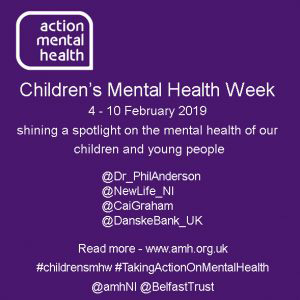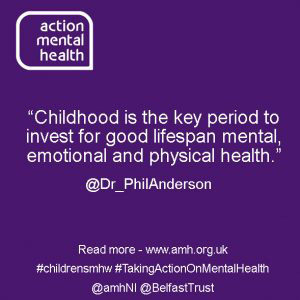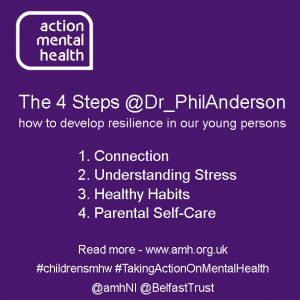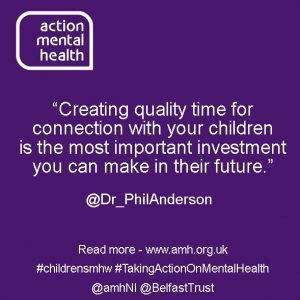Action Mental Health has teamed up with local experts to offer insight and advice on ways to develop emotional resilience among children and young people, as well as tips to help recognise the common causes of stress among our younger generation.
 From Monday, February 4th to Sunday, 10th, the fifth annual Children’s Mental Health Week, will shine a spotlight on the mental health of our children and young people.
From Monday, February 4th to Sunday, 10th, the fifth annual Children’s Mental Health Week, will shine a spotlight on the mental health of our children and young people.
During Children’s Mental Health Week, from February 4 to 10, AMH is featuring the guidance, knowledge and expertise of professionals like Dr Philip Anderson, consultant psychiatrist with the Belfast Health and Social Care Trust; with AMH partner, New Life Counselling, Dr Tracey Murray, art therapist counsellor with its OKAY team (Only Kids and Youths under 18); Cai Graham, local parenting coach and author of The Teenage Toolbox; and Danske Bank, sponsor of AMH’s Health Me programme, which is creating a short film featuring a child, a teacher and a parent who have experience of the programme.
Today, Dr Anderson shares his insight into children’s mental health, offering:
Four Steps to Help Develop Your Child’s Emotional Resilience
Supporting a child who is experiencing emotional or mental health difficulties, can feel like one of life’s most difficult challenges for parents, carers and families. Fifty percent of all mental health disorders are established by the age of 14 years and 75% are established by the age of 24 years, thus it is vital that young persons and their families get the right help and support.

Recently, there has been a lot of focus in popular media about the increasing levels of poor mental health amongst our young people. What has been especially concerning, ha
s been the rising number of young persons with emotional difficulties as a result of stress; this has risen by 48% since 2004. There have been various ideas put forward about why this would seem to have recently so dramatically increased. The suggestions have included; increasing academic pressures at school, excessive use of social media and cyber-bullying, and increasing social inequality. Whatever the reasons for this increase are, it would seem that our young persons are struggling to manage stress more than ever before.
Stress has been recently described by the World Health Organisation [WHO] as ‘health epidemic of the 21st century.’ Since the early 2000s, awareness has been growing across the globe of the substantial link between lifespan mental health difficulties and exposure to Adverse Childhood Experiences [ACEs]. ACEs are a group of traumatic childhood experiences – for example, exposure to domestic violence, parental divorce and loss of a parent – that are associated with ‘toxic stresses. Toxic stress is a chronic and severe activation of our bodies stress response, which can negatively impact a child’s developing brain and immune system. Accumulation of 3 or more ACEs has been associated with a number of negative physical and mental health problems. ACEs are becoming recognised as one of the most important public health challenges in the world today.
Despite all of this, it is really important to recognise that the normal day-to-day feeling of stress — like the kind that comes with sitting an exam or watching a large dog race towards you — is a normal and healthy part of life. It is our bodies’ way of helping us perform at our best and keep us safe from harm. But the received wisdom is that stress always causes our children harm and we should aim to help them avoid it at all costs. This poor understanding of stress can leave parents and young people feeling stressed about being stressed. Furthermore, it is often not possible to prevent your family from being exposed to the major challenges, including ACEs, that life can suddenly throw our way.
But what we can do is help our children develop the tools to cope with the stress caused by both the day-to-day and the major challenges known as ACEs. This is known as ‘resilience’. This is not just a young person’s ability to ‘bounce back’, but rather a capacity to adapt with life’s challenges whilst maintaining their emotional health. Research has demonstrated with the right nurturing, young person’s brains have a remarkable ability to adapt and resilience can be developed at any age.

Childhood is the key period to invest for good lifespan mental, emotional and physical health. It could be thought of similar to investing money in a bank savings account for your child’s future. Regular investment today can pay dividends for a child even fifty years in the future. With this in mind, these are 4 simple steps I have discussed with patients and their families [as well as my own friends and family] about how to develop resilience in our young persons;
Connection
Relationships are the most important way through which children can develop resilience to cope with the stress that life can throw our way. Creating quality time for connection with your children is the most important investment you can make in their future. However, this can be a real challenge, with the ever increasing work demands and the increasing financial burdens placed on families today.
However, children’s ability to regulate their emotions is not something that neither happens in a vacuum nor mysteriously appears in a crisis. It happens through the connection of a nurturing relationship with an ‘attuned’ parent. Attunement describes how reactive a person is to another’s emotional needs and moods. A parent who is well attuned will respond with appropriate language and behaviours based on their child’s emotional state. We can only learn to become attuned by getting to know our children’s particular ways of being and communication. This can only be achieved by giving our children our attention and validating their contribution to solving whatever the problem may be. By giving children a safe ‘connection space’ to talk about their feelings and in turn give reassurance about whatever is causing them distress – we can help ‘co-regulate’ their emotions – which in time they develop the internal tools to regulate themselves. Dr Daniel Siegel, Professor of Child Psychiatry at UCLA, states in his book, ‘No-Drama Discipline’, that ‘for a child…it’s extremely powerful to hear someone say, ‘I get you… I understand. I see why you feel this way.’ This kind of empathy disarms us.
 A key part of building connection is through the sense of ‘touch’; the reassurance from a parents hug can help a distressed child to regulate distress. Human physical contact releases the ‘good-feeling’ hormones such as serotonin that can help us to feel calmer. Neuroscience has shown that in, particularly early childhood, physical contact from our parents or carers, is essential for healthy brain development and emotional health. Professor Francis McGlone, a leading researcher on the biology of touch, has said ‘touch is not a sentimental human indulgence, it’s a biological necessity.’ However, western cultural trends have resulted in some parents and carers feeling increasingly hesitant about physical contact and children may be experiencing less physical contact than ever before. Dr Rangan Chatterjee, GP and author of the recently published ‘Stress Solution’ book, recommends that parents regularly hug their children and encourages the use of play fighting with older children.
A key part of building connection is through the sense of ‘touch’; the reassurance from a parents hug can help a distressed child to regulate distress. Human physical contact releases the ‘good-feeling’ hormones such as serotonin that can help us to feel calmer. Neuroscience has shown that in, particularly early childhood, physical contact from our parents or carers, is essential for healthy brain development and emotional health. Professor Francis McGlone, a leading researcher on the biology of touch, has said ‘touch is not a sentimental human indulgence, it’s a biological necessity.’ However, western cultural trends have resulted in some parents and carers feeling increasingly hesitant about physical contact and children may be experiencing less physical contact than ever before. Dr Rangan Chatterjee, GP and author of the recently published ‘Stress Solution’ book, recommends that parents regularly hug their children and encourages the use of play fighting with older children.
Modern life, particularly with the rise of social media and video gaming, can cause so many distractions that can get in the way of parents spending quality time with their children. Rather than simply outright banning these modern distractions, they can perhaps be used as opportunity to meet the young person in their environment and let conversation flow, for example, playing video games together. The potential day-to day opportunities for this are endless and can include; grocery shopping, making dinner and walking the dogs. Whatever way it works to bring this ‘connection space’ in your family, the key message is it feels safe, regular and reliable to the young person.
Connection is a conduit for compassion. Young people often model the ways their parents or carers connect with others. To this end, showing compassion in connection and helping others has been shown by research to strongly promote resilience and emotional health. Dr James R. Doty, Clinical Professor of the Department of Neurosurgery at Stanford, says that being compassionate is our default mode and this is impaired by the chronic stress of modern life. He says ‘when someone acts with compassionate intention it has a huge, huge positive effect on their physiology’ releasing calming body hormones. Demonstrating compassion and volunteering to help others, can allow your child to model these behaviours and build resilience throughout their life.
Our AMH MensSana team support all ages in the area of mental health and emotional well-being through a range of activities tailored to suit group needs. To find out more click here.